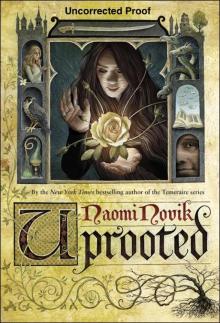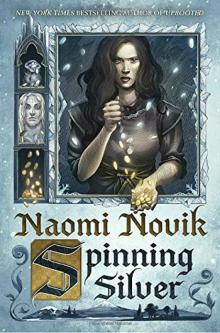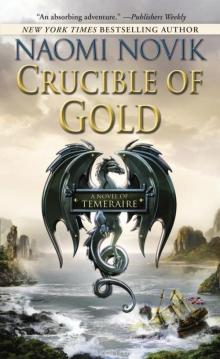Buried deep and other st.., p.1
Buried Deep and Other Stories, page 1





By Naomi Novik
Buried Deep and Other Stories
Uprooted
Spinning Silver
The Scholomance
A Deadly Education
The Last Graduate
The Golden Enclaves
Temeraire
His Majesty’s Dragon
Throne of Jade
Black Powder War
Empire of Ivory
Victory of Eagles
Tongues of Serpents
Crucible of Gold
Blood of Tyrants
Buried Deep is a work of fiction. Names, places, and incidents either are products of the author’s imagination or are used fictitiously. Any resemblance to actual events, locales, or persons, living or dead, is entirely coincidental.
Copyright © 2024 by Temeraire LLC
All rights reserved.
Published in the United States by Del Rey, an imprint of Random House, a division of Penguin Random House LLC, New York.
Del Rey and the Circle colophon are registered trademarks of Penguin Random House LLC.
The following stories have been previously published:
“Araminta, or, The Wreck of the Amphidrake” in Fast Ships, Black Sails, edited by Ann & Jeff VanderMeer (San Francisco: Night Shade, 2008)
“Vici” in The Dragon Book: Magical Tales from the Masters of Modern Fantasy, edited by Jack Dann and Gardner Dozois (New York: Ace, 2009)
“Buried Deep” in The Mythic Dream, edited by Dominik Parisien & Navah Wolfe (New York: Saga Press, 2019)
“Spinning Silver” in The Starlit Wood: New Fairy Tales, edited by Dominik Parisien & Navah Wolfe (New York: Saga Press, 2016)
“Commonplaces” in The Improbable Adventures of Sherlock Holmes, edited by John Joseph Adams (San Francisco: Night Shade, 2009)
“Seven” in Unfettered III: New Tales by Masters of Fantasy, edited by Shawn Speakman (Battle Ground, Wash.: Grim Oak Press, 2018)
“Blessings” in Uncanny Magazine, Issue 22, May/June 2018
“Lord Dunsany’s Teapot” in The Thackery T. Lambshead Cabinet of Curiosities, edited by Ann & Jeff VanderMeer (New York: Harper Voyager, 2011)
“Seven Years from Home” in Warriors, edited by George R. R. Martin & Gardner Dozois (New York: Tor, 2010)
“Dragons & Decorum” in Golden Age and Other Stories, by Naomi Novik (Burton, Mich.: Subterranean Press, 2017)
“Castle Coeurlieu” in Unfettered II: New Tales by Masters of Fantasy, edited by Shawn Speakman (Auburn, Wash.: Grim Oak Press, 2016)
Library of Congress Cataloging-in-Publication Data
Names: Novik, Naomi, author.
Title: Buried deep and other stories / Naomi Novik.
Description: First edition. | New York: Del Rey, 2024. | Identifiers: LCCN 2024023252 (print) | LCCN 2024023253 (ebook) | ISBN 9780593600351 (hardcover) | ISBN 9780593600368 (ebook)
Subjects: LCGFT: Fantasy fiction. | Short stories.
Classification: LCC PS3614.O93 B87 2024 (print) | LCC PS3614.O93 (ebook) | DDC 813/.6—dc23/eng/20240523
LC record available at https://lccn.loc.gov/2024023252
LC ebook record available at https://lccn.loc.gov/2024023253
Ebook ISBN 9780593600368
randomhousebooks.com
Book design by Susan Turner, adapted for ebook
Cover illustration: Sam Dunn
Cover design: Cassie Vu
ep_prh_7.0a_148178346_c0_r0
Contents
Author’s Note
Araminta, or, The Wreck of the Amphidrake
After Hours
Vici
Buried Deep
Spinning Silver
Commonplaces
Seven
Blessings
Lord Dunsany’s Teapot
Seven Years from Home
Dragons & Decorum
Castle Coeurlieu
The Long Way Round
About the Author
_148178346_
Author’s Note
I feel the need to warn you that this book is full of lies. Not the stories; the stories are as true as I could make them when I wrote them, but the introductions. When I’m finished writing something, it leaves me; if I tell you anything about these stories, the chances are extremely good that I made it up when an editor or an interviewer asked me, months or years after I wrote the actual story, and now I misremember it as what I was thinking at the time, or it’s what I think of them now, reading them again at a distance in some cases of decades.
The real truth is that only the stories themselves can tell you what I was thinking. If I could put one of them into a few neat and tidy paragraphs, I wouldn’t have bothered to write a story. There are no shortcuts in the Labyrinth.
So I have written introductions for these stories, but I invite you to ignore them, or to think of them as just that, introductions, as if we were at a party together and I had to leave but before I went I wanted to haphazardly introduce you to a good friend of mine that I thought you might get on with, by telling you something sort of vaguely interesting about them, and then disappearing, and after I’ve gone the friend might lean over and say, “Actually, that was all wrong, let me tell you the truth,” and you should believe them and not me.
And after you have read them, your opinion will be at least as good as mine. Books don’t have any pretense of living on their own, part of their magic. If you put the book down and go to the other room for a snack, the book will not go on without you; I’ve written these words and other people have edited them and formatted them and put them down on paper, but we’ve come as far as we can go, and the rest of the journey is yours, if you choose to lend them your eyes and your brain to live in for a little while.
Naomi
Araminta, or, The Wreck of the Amphidrake
My house growing up was full of words; my mother read widely. She had a specific taste in romance novels: thin and smooth, to be drunk up like a glass of wine in the evening and the empties taken back to the used bookstore in large bags to exchange for a case of new ones, or ones that had been read long enough ago to be good to taste all over again.
The Regencies were my favorites; Heyer of course, but almost any would do, except I had violent feelings about the ones that were wrong, by which I meant the ones where the characters were modern people playing dress-up in diaphanous muslins and riding in carriages, just pretending. Because I was interested in the rules, so inviolate and so obvious to the characters themselves, these people living inside narrow boxes, especially the women—in the short length of these books, their world couldn’t be more real and complicated, so instead they had to believe in the rules, inhabit them, or else it didn’t feel right. And I didn’t mind if they cheated, but they had to be clever about it.
So this is a Regency story: about a world with a different set of rules, and a very good cheater.
Lady Araminta was seen off from the docks at Chenstowe-on-Sea with great ceremony if not much affection by her assembled family. She departed in the company of not one but two maids, a hired eunuch swordsman, and an experienced professional chaperone with the Eye of Horus branded upon her forehead, to keep watch at night while the other two were closed.
Sad to say these precautions were not entirely unnecessary. Lady Araminta—the possessor of several other, more notable names besides, here omitted for discretion—had been caught twice trying to climb out her window, and once in her father’s library, reading a spellbook. On this last occasion she had fortunately been discovered by the butler, a reliable servant of fifteen years, so the matter was hushed up; but it had decided her fate.
Her father’s senior wife informed her husband she refused to pay for the formal presentation to the Court necessary for Araminta to make her debut. “I have five girls to see established besides her,” Lady D—said, “and I cannot have them ruined by the antics which are certain to follow.”
(Lest this be imagined the fruits of an unfair preference, it will be as well to note here that Araminta was in fact the natural daughter of her Ladyship, and the others in question her daughters-in-marriage, rather than the reverse.)
“It has been too long,” Lady D—continued, severely, “and she is spoilt beyond redemption.”
Lord D—hung his head: he felt all the guilt of the situation, and deserved to. As a youth, he had vowed never to offer prayers to foreign deities such as Juno; and out of obstinacy he had refused to recant, so it had taken three wives and fourteen years to acquire the necessary son. Even then the boy had proven rather a disappointment: sickly and slight, and as he grew older preferring of all things literature to the manly arts of fencing or shooting, or even sorcery, which would at least have been respectable.
“But it is rather messy,” young Avery said, apologetic but unmoving, even at the age of seven: he had inherited the family trait of obstinacy, in full measure. It is never wise to offend foreign deities, no matter how many good old-fashioned British fairies one might have invited to the wedding.
Meanwhile Araminta, the eldest, had long shown more aptitude for riding and shooting than for the cooler arts, and had a distressing tendency to gamble. Where her mother would have seen these inappropriate tendencies nipped in the bud, Lord D—, himself a notable sportsman, had selfishly ind
“It is not too much to ask that at least one of my offspring not embarrass me on the field,” had been one of his favorite remarks, when chastised; so while her peers were entering into society as polished young ladies, beginning their study of banking or medicine, Lady Araminta was confirmed only as a sportswoman of excessive skill, with all the unfortunate results heretofore described.
Something of course had to be done, so a match was hastily arranged with the colonial branch of a similarly exalted line. The rumors she had already excited precluded an acceptable marriage at home, but young men of good birth, having gone overseas to seek a better fortune than a second son’s portion, often had some difficulty acquiring suitable wives.
In those days, the journey took nearly six months, and was fraught with considerable dangers: storms and pirates both patrolled the shipping lanes; leviathans regularly pulled down ships, mistaking them for whales; and strange fevers and lunacies thrived amid the undersea forests of the Shallow Sea, where ships might find themselves becalmed for months above the overgrown ruins of the Drowned Lands.
Naturally Lady Araminta was sent off with every consideration for her safety. The Bluegill was a sleek modern vessel, named for the long, brightly painted iron spikes studded in a ridge down her keel to fend off the leviathans, and armed with no fewer than ten cannon. The cabin had three locks upon the door, the eunuch lay upon the threshold outside, the maids slept to either side of Araminta in the large bed, the chaperone had a cot at the foot; and as the last refuge of virtue she had been provided at hideous expense with a Tiresian amulet.
She was given no instruction for the last, either in its use or in how it would act to preserve the virtue in question, and only told with great emphasis to always keep it in its box and put it on only if the worst should threaten—the worst having been described to her rather hazily by Lady D—, who felt suspiciously that Araminta already knew a good deal too much of such things.
There were not many tears in evidence at the leave-taking, except from Lady Ginevra, the next-oldest, who felt it was her sisterly duty to weep, though privately delighted at the chance of advancing her own debut a year. Araminta herself shed none; only said, “Well, good-bye,” and went aboard unrepentant, having unbeknownst to all concealed a sword, a very fine pair of dueling pistols, and a most inappropriate grimoire in her dower chest during the upheaval of the packing. She was not very sorry to be leaving home. She was tired of being always lectured, and the colonies seemed to her a hopeful destination: a young man who had gone out to make his fortune, she thought, could not be quite so much a stuffed-shirt.
* * *
—
After all the preparations and warnings, the journey seemed to her so uneventful as to be tiresome: one day after another altered only by the degree of the blowing wind, until they came to the Drowned Lands and the wind died overhead. She enjoyed looking over the railing for the first few days, at the pale white gleam of marble and masonry which could yet be glimpsed in places, when the sailors gave her a bit of spell-light to cast down below.
“There’s nowt to see, though, miss,” the master said in fatherly tones, while she peered hopefully. Only the occasional shark, or sometimes one of the enormous sea-spiders, clambering over the ruined towers with their long spindly red legs, but that was all—no gleam of lost treasure, no sparks of ancient magic. “There’s no treasure to be had here, not without a first-rate sorcerer to raise it up for you.”
She sighed, and insisted instead on being taught how to climb the rigging, much to the disgust of the sailors. “Not like having a proper woman on board,” more than one might be heard quietly muttering.
Araminta was not perturbed, save by the increasing difficulty in coaxing interesting lessons from them. She resorted after a while to the privacy of her cabin, where through snatched moments she learned enough magic to hide the grimoire behind an illusion of The Wealth of Nations, so she might read it publicly and no-one the wiser. The Tiresian amulet she saved for last, and tried quietly in the middle of the night, hidden from the third eye beneath the bedcovers while the chaperone, Mrs. Penulki, snored. Araminta was taken aback by the results, which were immediate, and took it off again straightaway, but discovering that the effects reversed themselves with equal speed, after a moment an adventurous spirit overcame her first hesitation, and she decided on making a more thorough trial. The maids on either side of her, at first rather startled, were persuaded with only a little difficulty to participate. (It must be admitted they were somewhat young and flighty creatures, and already overawed by their noble charge.)
Two slow months they spent crossing the dead shallow water, all their sails spread hopefully, and occasionally putting men over the side in boats to row them into one faint bit of current or another. All the crew cheered the night the first storm broke, a great roaring tumult that washed the windows of Araminta’s high stern cabin with foam and left both of the maids moaning weakly in the water-closet. Mrs. Penulki firmly refused to entertain the possibility that Araminta might go outside for a breath of fresh air, even when the storm had at last died down, so she spent a stuffy, restless night and woke with the changing of the watch.
She lay on her back listening to the footsteps slapping against the wood, the creak of rope and sail. And then she was listening only to an unfamiliar silence, loud in its way as the thunder; no cheerful cursing, not a snatch of morning song or clatter of breakfast.
She pushed her maids until they woke and let her climb out to hurry into her clothes. Outside, the sailors on deck were standing silent and unmoving at their ropes and tackle, as if preserved in wax, all of them watching Captain Rellowe. He was in the bows, with his long-glass to his eye, aimed out to port. The dark tangled mass of storm-clouds yet receded away from them, a thin gray curtain dropped across half the stage of the horizon. The smooth curve of the ocean bowed away to either side, unbroken.
He put down the glass. “Mr. Willis, all hands to make sail, north-northwest. And go to quarters,” he added, even as the master cupped his hands around his mouth to bellow orders.
The hands burst into frantic activity, running past her; below she could hear their curses as they ran the ship’s guns up into their places, to the complaint of the creaking wheels. “Milady, you will go inside,” Captain Rellowe said, crossing before her to the quarterdeck, none of his usual awkward smiles and scraping; he did not even lift his hat.
“Oh, what is it?” Liesl, one of the maids, said, gasping, as Araminta came back in.
“Pirates, I expect,” Araminta said, tugging her enormously heavy dower chest out from under the bed. “Oh, what good will wailing do? Help me.”
The other ship emerged from the rain-curtain shortly, and became plainly visible out the windows of Araminta’s stern cabin. It was a considerable heavier vessel, with a sharp-nosed aggressive bow that plowed the waves into a neat furrow, and no hull-spikes at all: instead her hull was painted a vile greenly color, with white markings like teeth also painted around.
Liesl and Helia both moaned and clutched at one another. “I will die before you are taken,” Molloy, the eunuch, informed Araminta.
“Precious little difference it will be to me, if I am taken straightaway after,” she said practically, and did not look up from her rummaging. “Go speak to one of those fellows outside: we must all have breeches, and shirts.”
The chaperone made some stifled noises of protest, which Araminta ignored, and which were silenced by the emergence of the pistols and the sword.
The jewels and the trinkets were buried amid the linen and silk gowns, well bundled in cloth against temptation for straying eyes, so they were nearly impossible to fetch out again. The amulet in particular, nothing more than a tiny nondescript silver drachma on a thin chain, would have been nearly impossible to find if Araminta had not previously tucked it with care into the very back corner. It was just as well, she reflected, glancing up to see how the pirate vessel came on, that boredom had driven her to experimentation.

























